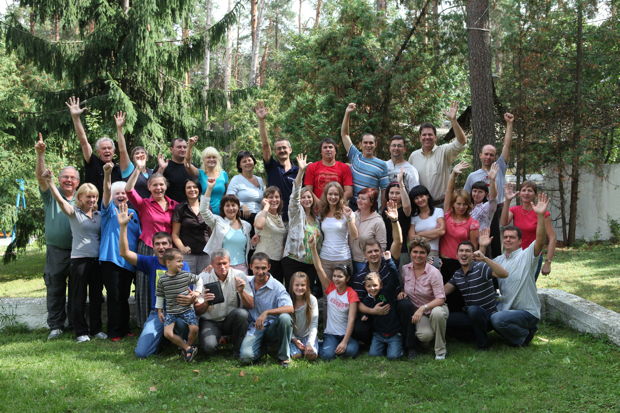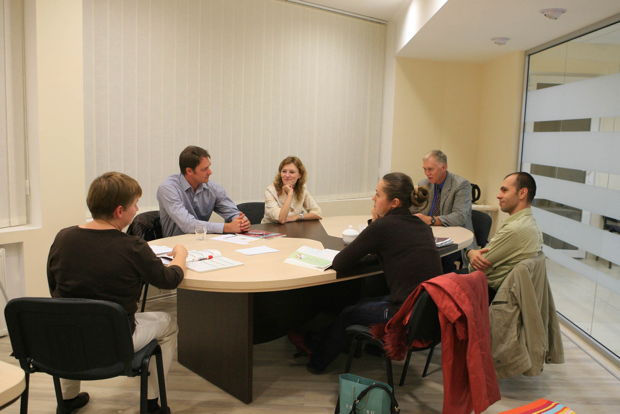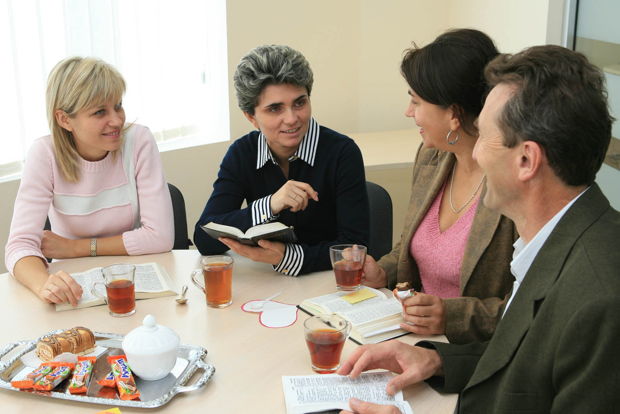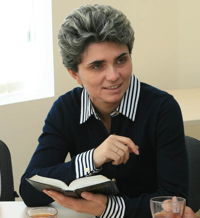Maia, would you tell us a bit about your background and how you came to faith in Christ?
Well, I grew up in Ukraine in a non-Christian family. My father was a Communist party member, and I was actually one of the leaders in the youth league of the Communist party in the high school where I studied. Actually, my first public speaking experience was when I was fourteen. I was reporting to four thousand Communist leaders in the city on behalf of the high school. So I guess my original life plan seemed to be set on a very different track from where I am right now. I was a student in the language university in Ukraine when we had a group of students from Biola come in with a Global Project of InterVarsity.
They came from Biola University, in California?
Yes, they came from Biola to Ukraine. It was the first group of real English speakers coming to my university, and there were sixteen of them. Sixteen Ukrainians were selected to be a part of this project. It was a six-week project. We didn't know that they were Christians, originally. We were told that they were coming to study Russian, and we would improve our English in the process.
I was married at that time—for one year already. And my husband graciously agreed to let me take this time from our family vacation time. It was during summer break, and it was a great professional opportunity to improve the language. I don't know how, but maybe two or three days before they came, the word came around that they were Christians. All the Ukrainians who were a part of that program, we were so disappointed. We thought,this is going to be terrible. We have to spend six weeks with religious fanatics, and we'll have to be hospitable and listen to all this stuff. It just seemed like a terrible way to spend six weeks out of summer vacation.
I remember when they drove up to the dormitory, and the doors of the bus opened and they started coming out, with all of the Ukrainians standing on the steps of the dormitory. We were kind of shocked. They didn't look like Christians. The Americans looked totally normal. I guess we expected a group of monks and nuns, from the stereotypes that we had in our education. In the universities at that time we had to go through two semesters of atheism, so we were told that Christianity, just like any other religion, is for weak people, for uneducated people who can't handle life, for people who need some kind of crutch in life. The stereotype we had is that someone would have to be deprived to believe.
But we had a really incredible six weeks. This is the first time I heard about God. Before that, I realized, I didn't even have a concept. I remember being a child and looking up into the stars and thinking, Do aliens exist? But I never thought about God, does God exist. It was a nonexistent concept, because we'd never heard about it in school or at home.
How about the Russian Orthodox Church? Was it present?
It was for the uneducated. We would see the elderly, you know, old ladies, crippled people going there. It's not for the strong, Soviet-educated elite, not for the educated people. Of course in Soviet times, Christians were not allowed to get a university education. And if you became a Christian, you'd be expelled if you were found out. So of course the Christians were not the educated people.

You definitely didn’t see young people ever going to church. So that was a part of the culture that was almost obsolete for us. We were thinking it's going to die with that generation. Nobody was asking questions about this.
So, I heard about God for the first time from them. Heard about Christ.
How did they conduct their time with you?
It was just really life on life. We had a program during the day, where we would go to the university, and there would be some discussions about culture, and they pretended to learn some Russian, which didn't get very far. And of course, we were learning some English, but it was kind of passive. And then in the evenings, we would be in the dormitory just, you know, like friends.
My roommate's parents were the leaders of the group, Jay and Betsy Shanor. Jay was a professor at Biola at that time, teaching Russian and Greek. So Carol, my roommate, and her parents, were a Christian family, the first Christian family I'd seen. I heard about Christ, but more importantly, I saw Christ in their lives. I felt like they loved me into the kingdom rather than convinced me. Just looking back, knowing my background in the Communist party, my whole life leading to that, it just seems like, no way they could have convinced me. It would have just been a clash of worldviews. You bring your Western worldview, and I've got mine, which is atheist.
They never shared the gospel in the way like using the four spiritual laws or something like that. There was no sense that they were pushing me or being intentional. But they just loved me, and they loved each other. And they talked about Christ when I asked questions. I remember one of the questions I asked Carol, "The meaning of life. What is it for you?" And she said, "Knowing Christ and growing in Christ." That was just weird. I didn't get it. So we had discussions I would think I was initiating, because I never felt like they were pushing. I knew if they pushed, I would resist. So it was very natural and I felt over time that I was getting convinced.
There was some struggle for me, because there was a fear I would appear inconsistent. Because of what I had been, believing in Christ would require a big shift. But at one point I felt that the pull to Christ was greater than all the fears I had about whether I would be still a student. It's '92, just after the fall of the Soviet Union, and I think two years earlier, I would have been expelled if I became a Christian.
So, I prayed together with Jay, the father of the family, and received Christ. And two days later, we were all at the lake, and Carol, my roommate, came to me and said, "There's water. Would you like to be baptized?" She showed me the passage in the Bible about that. I was like, "What am I going to do? I'm going to be expelled!” Sixteen people who were part of the program, plus the dean, plus the teachers were there. But I was the only one going to be baptized. And not even knowing at that time what the Bible says, you know, what Jesus says — if you're ashamed of me, I'll be ashamed of you — I just felt it wasn't right for me to make this step but then be secretive about it. So I was baptized. Jay baptized me there.
Actually one of the girls on the Ukrainian team who later became a believer said that was a very important thing for her to see. Because she was also struggling with what would be the consequences in her life. Later, she actually became a missionary to Israel.
So anyway, I became a Christian. I called my husband and told him, "I became a Christian." And he's like, "Yeah, Communist leader, Christian, doesn't make sense." But he said, "I don't want to hear about it; you believe whatever you want. Just as long as you don't try to convince me, we're fine.” Of course we had a very interesting year. He actually started secretly reading the Bible. He would ask me questions, but when I tried to answer, he would get frustrated. He would say, "You're trying to indoctrinate me. I told you not to talk to me about this."
But he would continue to ask you questions?
He would ask questions, yes. And then the next year, Jay Shanor, this professor from Biola, was bringing another global project to my university. I was not a part of that group, but I would join them in the evening. When my husband found out that Jay was coming back, he prepared a long list of questions to corner Jay, to convince him that this Christianity was just ridiculous.
He ended up spending hours and hours with Jay, just asking questions and Jay would show him the answers in the Bible. They would read the Bible together. And the amazing thing — Jay before that time had been studying Russian for thirty years. He started back in the Air Force. And he says God must have kept him keeping up with the language just for Nick. I think he would say, "My wife told me these things, but I couldn't take it from my wife — from a woman, and my wife." But it sounded totally different from a man who's a professor, educated.
And Jay was speaking Russian with him.
Yes, my husband couldn’t speak any English. So they were carrying the conversation on in Russian, and I wasn't even mediating. So through that time, I think there were about three weeks when Nick was kind of alongside Jay. After Jay left, maybe a few weeks later, we continued talking about it, and Nick prayed together with me and accepted Christ.
You said at one point the other day that you were getting discipling snail-mail. You were writing letters and then you'd get letters back?
Yes. After I became a Christian, I looked around, and there were no other Christians on campus. I don't know what I was thinking, but I started leading a Bible study group. I didn't know that I was leading it. If somebody told me I was leading it, I would have been scared. But it was the most natural thing. I had learned this truth. Now I wanted my friends to know. And in the dormitory, you just put tea and cookies out, and, you know, students will come.
I had two more years in the university before graduating. The discipleship I received was through regular mail because there was no email at that time. When I was studying the Word myself, or when we were studying as a group, if we ran into some question, I would write to Jay and Betsy. Then three weeks that way, and then three weeks back, and six weeks later we'd get the answer to the question. We wouldn’t remember the question anymore!
But again, looking back at that time, I'm thinking it was very obvious that the Holy Spirit was working, because I certainly didn't know what I was doing. I didn't have the answers. We were just reading and people were coming to Christ through that experience. When I graduated two years later, we had eight Bible study groups on campus, and it still continues. The ministry on campus still continues.
Did many of that original group of sixteen come to Christ?
One other, yes.
So these other people were not from that group?
Well, the first people who started coming to my room to study the Bible, they were from that original sixteen, but then others were coming and it was all mixed and I think only one from that original group became a believer.
We stay in touch with Jay and Betsy. When we go to California, we stay with them. And I'm thinking, looking back, looking from their perspective of the whole thing, they spent six weeks, raised all that money to come, brought the group, invested time and money, and only one came to Christ. It must have been very discouraging.
But then, you know, the ministry continues to grow on campus. We don't even know how much God is doing through those who came to Christ as a result of those small groups. I believe the ministry that my husband and I have, the church-planting ministry, is a result of their faithfulness. They came and they shared with me and then later with my husband. So it's not in vain, even if we don't know, even if it feels like it's too small, the return of on investment is great.

Another thing you said yesterday was regarding short-term missions such as this six-week project. For you, it started a relationship, with the Shanors and with Christ. But that didn't happen for everyone.
Well, you asked how many came to Christ after, and I think one of the factors why people from that original group might have fallen out of it was this. They all formed good relationships. It was amazing. We were all amazed how these people came from the other side of the world, and all of a sudden, there was this friendship and feeling of love. And our people in Ukraine, they're very reserved, and it was . . . special. But then, when the Americans left, most of the students didn't stay in touch. And I think it was hurtful. People started questioning the message because they felt like if the relationship, the friendship, was not true, how can we trust what they were saying?
Right now our ministry is almost all done by nationals, but we do have people coming over from the States for short-term trips, like one week long, to help us with outreach through ESL. We tell people, "You're coming for a week. But make a commitment not for a week. Make a commitment for a year, please. So whatever relationships you build here, it's not just your responsibility for one week to be nice and to communicate. But as you go back home, obviously you return to a busy life, but again, just think about it as a one-year commitment versus one-week commitment."
I think it's a big disappointment for people to experience that love that I believe is not just the visitor’s love, but is Christ's love showing through. And then they have the withdrawl pains when the visitor leaves. It's like, "Was it real?" It’s actually harder later to reach people who have been disappointed or disillusioned. It's easier with the ones who have never heard.
I think the global projects in the early 90s were very effective. We are now connected to a lot of people in different ministries, like orphan ministries, camps, many different ones. A lot of those are led by people from that first generation of believers. They were brought to Christ by missionaries who came, like this, for a few weeks. Of course there was a great awakening in our country in the 90s when people for the first time heard about Christ. And those who made the commitment were very serious about it.
So, you were chosen early in your life to give this big speech in front of all of these people and then chosen to be part of the group for the InterVarsity Global Project. Obviously you were recognized as a leader. What were the repercussions after you were baptized, after you accepted Christ?
There were no repercussions because there was already freedom. I couldn't have known this. I mean, it could have gone either way depending on the leadership of the school, but at that time, there were no repercussions. And because I was a leader, I didn't feel any kind of persecution from my peers because I was respected. We see the same thing right now with people we reach, the professionals in Ukraine. We see that when it's a principal of the school or a business person that comes to Christ, people puzzle. They're wondering why. Is somebody sick in your family? Did you lose a job? What pushed you in there? It opens the door for discussion.
We saw in one of the cities, the principal of a school came to Christ, and teachers would ask her questions. She initiated a Bible study and pretty much everybody in her school, all the teachers, got involved and joined Bible studies that were led by our staff. But she was the one who started the curiosity. And they were thinking, if she's thinking that this is not ridiculous, maybe there's something to it.

Unfortunately in our society, because of the persecution of Christians in Soviet times and Christians not being able to get education or get into positions of influence, there are stereotypes that Christians are uneducated fanatics. This was reinforced by the system. So right now when we are working and reaching professionals, all our staff are university-educated professionals themselves. So when I'm meeting with somebody and sharing my faith and they know I've got three degrees — I've got a language degree, I have an MBA, and I have a management degree. We speak on the same level about anything. And that's the beginning of the breaking of these stereotypes for people.
That's the first barrier, because people culturally, automatically think that Christianity is for lower classes; it's for the poor and for the ignorant. So that's what we're trying to change in Ukraine and have help from organizations like InterVarsity, Campus Crusade, and Navigators who start with students, and then our ministry International Partnerships which is focused on people who have already graduated. We felt like there was quite a lot of good work being done in the universities, but churches have not been effective in reaching professionals because they are not led by professionals.
So you actually have a ministry to professionals?
Yes. We started in ‘97. In ‘92 I came to Christ, in ‘93 my husband, and then in ‘97 we started this ministry, International Partnerships, which is basically a ministry of professionals like ourselves who came to Christ in our university years to reach to professionals who do not know Christ in society. So that's what we're doing: a lot of outreach, evangelism efforts, and then we also discovered very quickly as we saw people coming to Christ, we discovered that they are not going to church.

The staff team of International Partnerships.
My first experience with church was that I came and I've never been so negatively treated, ever in my life. They didn't like that I had a short haircut. They didn't like that I wore pants rather than skirts. They were very legalistic. And they didn't like that I had an education. A lot of churches in Ukraine, to protect their children from the hurt, developed a belief that education is sin, it's a sin of pride, you don't want education.
So it just reinforces the stereotypes, in and outside the church.
Yes. It was like everything about me was wrong. So I went away from there thinking, I don't want this. I wrote to Jay and Betsy. They were encouraging me to find fellowship. I said, "I can't. I'm not used to being treated that way." I asked, "Do I have to grow long hair and wear a long skirt? Does the Bible command this?" We saw the same thing as we were reaching professionals. A professor would go to a local church, and the pastor wouldn’t even use good grammar. This new believer just didn't fit and wasn’t necessarily welcome in a church. And with very few churches in the cities, we need many, many more.
We're working right now in the capitals of the regions with population 400,000 to 4 million. And there would be just maybe four, five evangelical churches. So there's a great need to plant many more. Right now we have ten churches planted in these cities.

Are they house churches?
Well, we start with Bible discussion groups. We call them “discussion groups” because that's more appealing to professionals. But as people come to Christ, we come together for fellowship. In Kiev, we have our own facility, but other groups rent facilities. It’s kind of ironic. Very often they rent places that were built in Soviet times for Communist meetings. They were called "culture palaces." And now culture palaces, for the most part, are rented by new church plants because they don't have money to build or to buy. The churches are anywhere from seventy to three hundred people.

Our vision is not megachurches. We'd like to have many churches in the city, and we feel like we have completed the first cycle in our strategy. We planted churches, but now we just recently — a week before I came here — had strategic planning for the ministry, and ten churches that have been planted have committed, in the next ten years, to plant ten new ones. So we'd like to see multiplication. Because again, it's not enough just to get one church. And it's easy to get comfortable, but we constantly try to encourage our people to think about the world outside our walls.
The small groups continue to be essential to the growth. That's something I learned from InterVarsity days. That's how I saw life change, when people get into the Word, and that's what we do with the professionals. They wouldn't come to just a Bible discussion group. We can't advertise that. They're just not interested. It's not relevant to them. But we offer things like English as a second language, photography schools, guitar schools, we have cooking classes — just all kinds of things that appeal to someone either professionally or personally. And with that we say we'll study the Bible and discuss. So the first hour would be English, the second hour discussion.
Initially they might agree kind of grudgingly, like, I don't need it, but okay. But we see, again and again, the Word of God is working, and people start like this, and then they gradually get into discussions, and again, it's what they were talking about in this conference. It's contextualizing the Gospel, helping them see that it relates to life. It's not just some set of ideas and beliefs you have to buy in to. It has to do with your life and trying to connect with the culture. It's been great to have a connection with Redeemer and we are reading all the books of Tim Keller.

We’re working in urban areas reaching professionals, difficult people, kind of like the people here in New York: busy, content with their life, not seeking God, not even asking questions. It’s been interesting to observe that as well as have some meetings with Faith In Work people at Redeemer, just learning from their approach to equipping professionals to be the agents of transformation in the culture. So I'm taking back a lot of things to think about, and considering how to translate them into our setting. It won't look like this. It will look different. But I think that the goals that we have are similar. We want to transform our cultures. We want to bring the Gospel to people, to change the culture from within the culture.
photos contributed by Maia Mikhaluk











